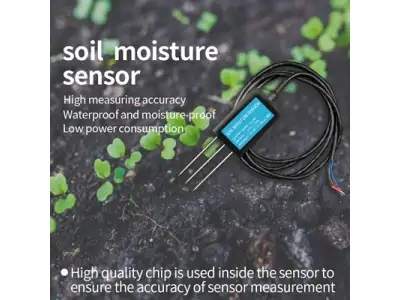
The role of soil sensors in smart agriculture
Soil is the main material basis for plants to survive, and it can provide crops with the necessary water, fertilizer, heat and air for their growth.

Soil is the main material basis for plants to survive, and it can provide crops with the necessary water, fertilizer, heat and air for their growth.
Soil is the main material basis for plants to survive, and it can provide crops with the necessary water, fertilizer, heat and air for their growth. With the rapid development of science and technology in today's society, the requirements for agricultural planting soil do not need to be judged by traditional experience. The advent of various intelligent soil sensors makes modern agriculture more efficient and accurate. Various soil detectors are used for agricultural planting production. Provide scientific data basis. What are the specific parameters that need to be monitored? What does it do?
Soil moisture sensor: also known as soil moisture sensor, composed of stainless steel probes and waterproof probes, which can be buried in soil and dams for long-term use to conduct fixed-point monitoring and online measurement of surface and deep soil moisture. Used in conjunction with a data collector, it can be used as a tool for fixed-point monitoring or mobile measurement of moisture (ie, farmland moisture detector).
Soil temperature sensor: The soil temperature sensor can monitor the temperature of the soil, atmosphere and water. A suitable soil temperature is conducive to the growth of plants. If the temperature is too low or too high, it is not conducive to the growth of plants. Crop seeds must germinate within a suitable soil temperature range. Within a certain temperature range, the higher the soil temperature, the faster the growth and development of crops, and the growth of different plants has different requirements for temperature. By monitoring the soil temperature, the soil temperature can be maintained within a suitable growth temperature range for crops to ensure that crops increase production and income.
Monitoring of soil pH: various plants have their own suitable soil acidity and alkalinity for growth, and most plants are difficult to grow normally when the pH is too high or too low. Some diseases can only occur within a certain range of pH value, such as damping-off disease tends to occur on alkaline and neutral soil. Suitable soil acidity and alkalinity help the growth of agricultural products and reduce pests and diseases, so the monitoring of soil pH is very necessary.
Monitoring of soil nitrogen, phosphorus and potassium: nitrogen, phosphorus and potassium play an important role in the growth and development of crops. They are the components of many important organic compounds in crops, or widely affect the growth and metabolism of crops in the form of enzyme activators. It is impossible for any physiological and biochemical process in crops to be completed by a certain element alone. Each element has its own physiological function and interaction, and jointly undertakes various metabolic energy supply to ensure the normal growth of crops.

Soil EC sensor: The current field rapid soil EC value is mainly measured by a digital display soil EC meter. The principle uses a special metal material as a sensor to realize the rapid determination of the EC value of soil. High concentration of soluble salt Classes can damage plants or cause the death of plant roots. Soil EC sensors can improve this situation.
Soil sensors are used to monitor crop irrigation, soil air changes, and large-area surface inspection services. Data on soil moisture, soil nitrogen, phosphorus and potassium content, and pH values are being used in precision agriculture. In the process of development, it plays an increasingly important role in the restoration of electricity, so as to realize scientific monitoring, rational planting, help farmers resist and reduce disasters, improve comprehensive agricultural benefits, and promote the transformation and upgrading of modern agriculture.